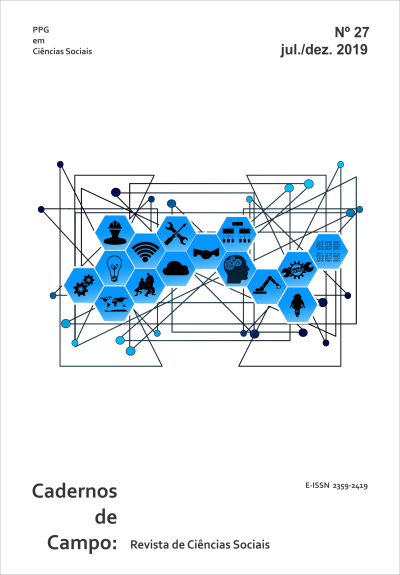The internationalization of brazilian bioenergy research groups: networking and political-scientific strategies
Keywords:
Science internationalization, Science & technology studies, Scientific practices and strategies, Latin-American science, Bioenergy,Abstract
The internationalization of science and technology (S&T) has been a subject of extreme relevance and relevance in the contemporary context. This text aims to produce reflective knowledge about this process of internationalization of research groups and national scientific production, focusing on bioenergy research groups. We propose to investigate the conflicts, the interests that mobilize the constitution of the networks. Our methodology is based on qualitative data collection, using semi-structured interviews guided by a basic script. The interviewees were selected from individual and collective involvement with international research networks in the area of energy. Besides the interviews projects and research reports made available by the groups and their scientific production available on platforms were analyzed. We found a cleavage between national and international scientific activities, with distinct levels of validation and scientific recognition of researchers at both poles, as well as an internal process of intellectual extroversion and not only of cognitive and scientific imposition between nations.
Downloads
References
ARELLANO HERNÁNDEZ, Antonio; ARVANITIS, Rigas; VINCK, Dominique. 2012. Circulation et connexité mondiale des savoirs. Éléments d'anthropologie des connaissances en Amérique latine. Revue d'anthropologie des connaissances, v. 6, n. 2, p. 245-272.
BEIGEL, Fernanda. 2013. The Politics of Academic Autonomy in Latin America. New York: Routledge.
______. 2017. Científicos Periféricos, entre Ariel y Calibán. Saberes Institucionales y Circuitos de Consagración en Argentina: Las Publicaciones de los Investigadores del CONICET. Dados, v. 60, p. 825-865.
BODANSKY, Daniel. 2001. The history of the global climate change regime. In: LUTHERBACKER, U. e SPRINZ, D. F. International Relations and Global Climate Change. Cambridge, Massachusets: MIT Press.
BOURDIEU, Pierre. 2002. Les conditions sociales de la circulation internationale des idées. Actes de la recherche en sciences sociales, v. 5, n. 145, p. 3-8.
______. 2004. Os usos sociais da ciência. Por uma sociologia clínica do campo científico. São Paulo: Editora UNESP.
BRINGEL, Breno; DOMINGUES, José Maurício. 2015. Teoria social, extroversão e autonomia: impasses e horizontes da sociologia (semi)periférica contemporânea. Caderno CRH, v. 28, p. 59-76.
CALLON, Michel. 1986. Some elements of a sociology of translation: domestication of the scallops and the fishermen of St. Brieuc Bay. In: LAW, J. Law, Power, action and belief: a new sociology of knowledge? London: Routledge.
______. 1995. Technological Conception and Adoption Network: Lessons for the CTA Practitioner. In: RIP, A.;MISA, T. J., et al. Managing Technology in Society. London, New York: Pinter.
CASTRO, Marco Vinicius de; ALVES, Daniela Alves de. 2016. As controvérsias sociotécnicas sobre as especificações do biodiesel. Sinais, v. 20, p. 99-116. COLLINS, H. M. 1974. The TEA Set: Tacit Knowledge and Scientific Networks. Science Studies, v. 4, n. 2, p. 165-185.
FALKNER, Robert. 2014. Global environmental politics and energy: Mapping the research agenda. Energy Research & Social Science, v. 1, p. 188-197. FERNANDES, Ana Maria. 2000. A construção da ciência no Brasil e a SBPC. 2a edição. Brasília: Editora UNB.
FERREIRA, Mariana Toledo. Periferia pensada em termos de falta: uma análise do campo da genética humana e médica. Revista Sociologias, Porto Alegre, ano 21, n.50, jan-abr 2019, p.80-115.
GRANOVETTER, Mark. 1985. Economic Action and Social Structure: The Problem of Embeddedness. American Journal of Sociology, v. 91, n. 3.
KNORR-CETINA, Karin. 1981. The Manufacture of Knowledge. An Essay on the Constructivist and Contextual Nature of Science. New York: Pergamon Press. KREIMER, Pablo. 2006. ¿Dependientes o Integrados? La ciencia latinoamericana y la nueva división internacional del trabajo. Nómadas (Col), n. 24, p. 199-212.
______. 2011. Internacionalização e tensões da ciência latino-americana. Ciência e Cultura, v. 63, p. 56-59.
KREIMER, Pablo; VESSURI, Hebe. 2018. Latin American science, technology, and society: a historical and reflexive approach. Tapuya: Latin American Science, Technology and Society, v. 1, n. 1, p. 17-37.
LATOUR, Bruno. 1987. Science in Action. Cambridge: Harvard University Press. LAW, John. 1999. After Ant: Complexity, Naming and Topology. The Sociological Review, v. 47, n. 1, p. 1-14.
MEDINA, Leandro Rodriguez. 2013a. Centers and Peripheries in Knowledge Production. New York: Routledge.
______. 2013b. Objetos subordinantes: la tecnología epistémica para producir centros y periferias Revista Mexicana de Sociología, v. 75, n. 1, p. 7-28.
MIGNOLO, Walter. 2003. Histórias Locais / Projetos Globais: Colonialidade, Saberes Subalternos e Pensamento Liminar. Belo Horizonte: Editora UFMG. 505.
MOTOYAMA, Shozo. 2004. Prelúdio para uma história: ciência e tecnologia no Brasil. São Paulo: EDUSP. 518.
NEVES, Fabrício. 2014. A contextualização da verdade ou como a ciência torna-se periférica. CIVITAS, v. 14, n. 3, p. 556-574.
OREGIONI, María Soledad. 2015. Aspectos sociales de la internacionalización de la investigación. Una propuesta de abordaje. Revista iberoamericana de ciencia tecnología y sociedad, v. 10, n. 30, p. 199-229.
PORTO-GONÇALVES, Carlos Walter. 2008. Outra Verdade Inconveniente: a nova geografia política da energia numa perspectiva subalterna. Universitas Humanística, p. 327-365.
QUIJANO, Aníbal. 2003. Colonialidad del Poder, Eurocentrismo y America Latina. In: LANDER, E. La colonialidad del saber: eurocentrismo y ciencias sociales. Perspectivas latinoamericanas. Buenos Aires: CLACSO.
SANTOS, Boaventura de Sousa. 2011. Para um novo senso comum: a ciência, o direito e a política de transição paradigmática. Volume 1. A crítica da razão indolente. Contra o desperdício da experiência. São Paulo: Cortez.
SCHWARTZMAN, Simon. 2001. Um espaço para a ciência: a formação da comunidade científica no Brasil. Brasília: MCT/CEE.
SOUSA, Ivan Sergio Freire de. 2015. Sociologia da Agroenergia: uma abordagem necessária. STAR, Susan Leigh; GRIESEMER, James R. 1989. Institutional Ecology, `Translations' and Boundary Objects: Amateurs and Professionals in Berkeley's Museum of Vertebrate Zoology, 1907-39. Social Studies of Science, v. 19, n. 3, p. 387-420.
STEPAN, Nancy. 1976. Gênese e evolução da ciência brasileira: Oswaldo Cruz e a política de investigação científica e médica. Rio de Janeiro: Artenova. SUBRAMANIAM, Banu et al. 2016. Feminism, Postcolonialism, Technoscience. In: FELT, U.;FOUCHÉ, R., et al. The Handbook of Science and Technology Studies. 4th edition. Cambridge, Massachusetts: MIT Press.









